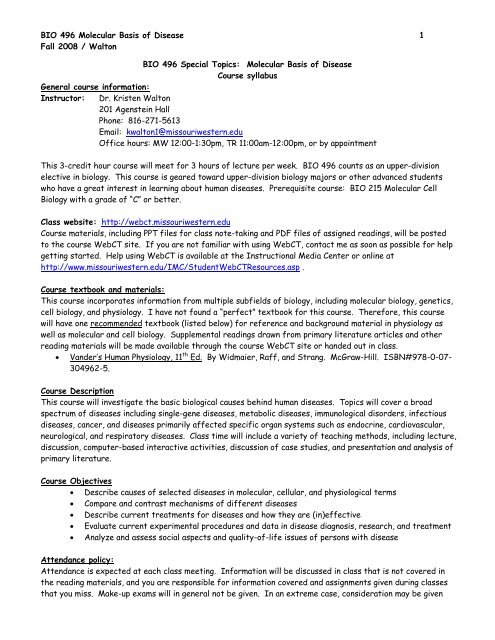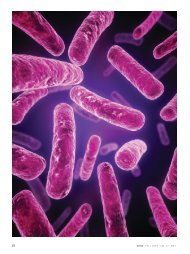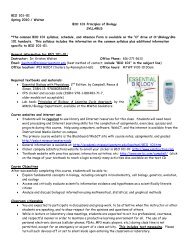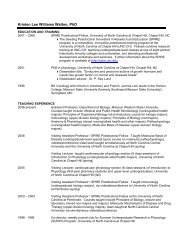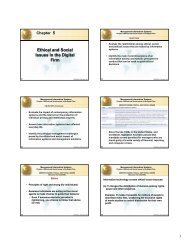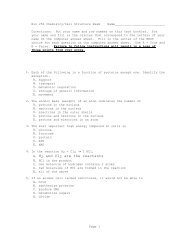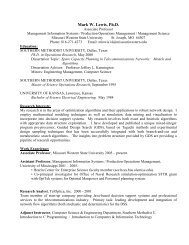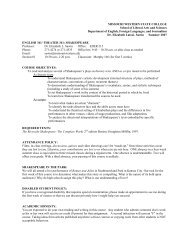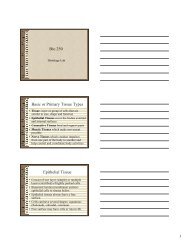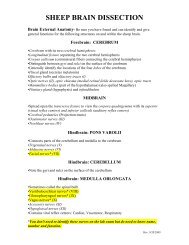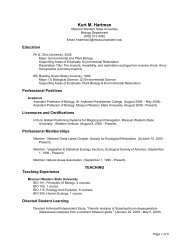Course syllabus and schedule - Academic Resources at Missouri ...
Course syllabus and schedule - Academic Resources at Missouri ...
Course syllabus and schedule - Academic Resources at Missouri ...
You also want an ePaper? Increase the reach of your titles
YUMPU automatically turns print PDFs into web optimized ePapers that Google loves.
BIO 496 Molecular Basis of Disease 1<br />
Fall 2008 / Walton<br />
BIO 496 Special Topics: Molecular Basis of Disease<br />
<strong>Course</strong> <strong>syllabus</strong><br />
General course inform<strong>at</strong>ion:<br />
Instructor: Dr. Kristen Walton<br />
201 Agenstein Hall<br />
Phone: 816-271-5613<br />
Email: kwalton1@missouriwestern.edu<br />
Office hours: MW 12:00-1:30pm, TR 11:00am-12:00pm, or by appointment<br />
This 3-credit hour course will meet for 3 hours of lecture per week. BIO 496 counts as an upper-division<br />
elective in biology. This course is geared toward upper-division biology majors or other advanced students<br />
who have a gre<strong>at</strong> interest in learning about human diseases. Prerequisite course: BIO 215 Molecular Cell<br />
Biology with a grade of “C” or better.<br />
Class website: http://webct.missouriwestern.edu<br />
<strong>Course</strong> m<strong>at</strong>erials, including PPT files for class note-taking <strong>and</strong> PDF files of assigned readings, will be posted<br />
to the course WebCT site. If you are not familiar with using WebCT, contact me as soon as possible for help<br />
getting started. Help using WebCT is available <strong>at</strong> the Instructional Media Center or online <strong>at</strong><br />
http://www.missouriwestern.edu/IMC/StudentWebCT<strong>Resources</strong>.asp .<br />
<strong>Course</strong> textbook <strong>and</strong> m<strong>at</strong>erials:<br />
This course incorpor<strong>at</strong>es inform<strong>at</strong>ion from multiple subfields of biology, including molecular biology, genetics,<br />
cell biology, <strong>and</strong> physiology. I have not found a “perfect” textbook for this course. Therefore, this course<br />
will have one recommended textbook (listed below) for reference <strong>and</strong> background m<strong>at</strong>erial in physiology as<br />
well as molecular <strong>and</strong> cell biology. Supplemental readings drawn from primary liter<strong>at</strong>ure articles <strong>and</strong> other<br />
reading m<strong>at</strong>erials will be made available through the course WebCT site or h<strong>and</strong>ed out in class.<br />
• V<strong>and</strong>er’s Human Physiology, 11 th Ed. By Widmaier, Raff, <strong>and</strong> Strang. McGraw-Hill. ISBN#978-0-07-<br />
304962-5.<br />
<strong>Course</strong> Description<br />
This course will investig<strong>at</strong>e the basic biological causes behind human diseases. Topics will cover a broad<br />
spectrum of diseases including single-gene diseases, metabolic diseases, immunological disorders, infectious<br />
diseases, cancer, <strong>and</strong> diseases primarily affected specific organ systems such as endocrine, cardiovascular,<br />
neurological, <strong>and</strong> respir<strong>at</strong>ory diseases. Class time will include a variety of teaching methods, including lecture,<br />
discussion, computer-based interactive activities, discussion of case studies, <strong>and</strong> present<strong>at</strong>ion <strong>and</strong> analysis of<br />
primary liter<strong>at</strong>ure.<br />
<strong>Course</strong> Objectives<br />
• Describe causes of selected diseases in molecular, cellular, <strong>and</strong> physiological terms<br />
• Compare <strong>and</strong> contrast mechanisms of different diseases<br />
• Describe current tre<strong>at</strong>ments for diseases <strong>and</strong> how they are (in)effective<br />
• Evalu<strong>at</strong>e current experimental procedures <strong>and</strong> d<strong>at</strong>a in disease diagnosis, research, <strong>and</strong> tre<strong>at</strong>ment<br />
• Analyze <strong>and</strong> assess social aspects <strong>and</strong> quality-of-life issues of persons with disease<br />
Attendance policy:<br />
Attendance is expected <strong>at</strong> each class meeting. Inform<strong>at</strong>ion will be discussed in class th<strong>at</strong> is not covered in<br />
the reading m<strong>at</strong>erials, <strong>and</strong> you are responsible for inform<strong>at</strong>ion covered <strong>and</strong> assignments given during classes<br />
th<strong>at</strong> you miss. Make-up exams will in general not be given. In an extreme case, consider<strong>at</strong>ion may be given
BIO 496 Molecular Basis of Disease 2<br />
Fall 2008 / Walton<br />
only if you contact the instructor before the exam time. Make-up present<strong>at</strong>ions, assignments, or quizzes will<br />
not be available for unexcused absences. L<strong>at</strong>e assignments will be penalized by 10% of the total possible<br />
points per weekday l<strong>at</strong>e.<br />
Assessment <strong>and</strong> grading policies<br />
Mastery of course content <strong>and</strong> objectives will be assessed by exams, assignments <strong>and</strong> quizzes, present<strong>at</strong>ion<br />
of d<strong>at</strong>a from selected journal articles or of other assigned m<strong>at</strong>erials, <strong>and</strong> a paper project. Points will be<br />
distributed as follows:<br />
• Regular lecture exams 2 x 100 points = 200 pts<br />
• Final exam 150<br />
• Quizzes, assignments, in-class activities 100-200<br />
• Present<strong>at</strong>ions of primary liter<strong>at</strong>ure, d<strong>at</strong>a, or case studies 10 pts each (40 pts maximum)<br />
• Human disease project paper 75<br />
Letter grades for the course will be assigned according to the following:<br />
Total points possible: 565-665 points<br />
Grading scale: 90-100% = A; 80-89% = B; 70-79% = C; 60-69% = D; below 60% = F<br />
Disabilities:<br />
Any student requiring accommod<strong>at</strong>ion to perform successfully in the course should see me within the first<br />
week of class <strong>and</strong> arrangements will be made as necessary.<br />
<strong>Academic</strong> Honesty Policy <strong>and</strong> Due Process:<br />
<strong>Academic</strong> honesty is required in all academic endeavors. Viol<strong>at</strong>ions of academic honesty include any instance<br />
of plagiarism, che<strong>at</strong>ing, seeking credit for another’s work, falsifying documents or academic records, or any<br />
other fraudulent activity. Viol<strong>at</strong>ions of academic honesty may result in a failing grade on the assignment,<br />
failure in the course, or expulsion from the University. When a student’s grade has been affected, viol<strong>at</strong>ions<br />
of academic honesty will be reported to the Provost or design<strong>at</strong>ed represent<strong>at</strong>ive on the <strong>Academic</strong> Honesty<br />
Viol<strong>at</strong>ion Report forms. Please see the 2006-07 Student H<strong>and</strong>book <strong>and</strong> Calendar on page 21 for specific<br />
activities identified as viol<strong>at</strong>ions of this policy <strong>and</strong> the student due process procedure. This h<strong>and</strong>book is also<br />
available online <strong>at</strong> http://www.missouriwestern.edu/h<strong>and</strong>book/index.pdf .<br />
Plagiarism is a specific kind of academic dishonesty in which you take another’s ideas or words <strong>and</strong> claim them<br />
as your own. When you draw on someone else’s work, you must indic<strong>at</strong>e the source of th<strong>at</strong> m<strong>at</strong>erial, whether<br />
you are repe<strong>at</strong>ing another’s words, argument or thought. Even if you paraphrase another’s work <strong>and</strong> are not<br />
using the exact wording, you are still required to indic<strong>at</strong>e the source of the m<strong>at</strong>erial. This m<strong>at</strong>erial must be<br />
clearly identified with appropri<strong>at</strong>e cit<strong>at</strong>ions. If you do not do th<strong>at</strong>, you have plagiarized those m<strong>at</strong>erials. Any<br />
time you copy <strong>and</strong> paste any writing th<strong>at</strong> is not your own for an assignment, you must use quot<strong>at</strong>ion marks <strong>and</strong><br />
give the source of th<strong>at</strong> m<strong>at</strong>erial. If you cut <strong>and</strong> paste without noting wh<strong>at</strong> you have done, you will be guilty of<br />
plagiarism. Even if the writing is your own, if it has been used for a previous assignment th<strong>at</strong> should be<br />
indic<strong>at</strong>ed.<br />
As per the above MWSU policy st<strong>at</strong>ement, a viol<strong>at</strong>ion of academic honesty or plagiarism will result in a<br />
zero grade on the assignment or exam. A second viol<strong>at</strong>ion of academic honesty or plagiarism may<br />
result in failing the course.
BIO 496 Molecular Basis of Disease 3<br />
Fall 2008 / Walton<br />
Schedule of topics (tent<strong>at</strong>ive <strong>and</strong> subject to change):<br />
Week Topics<br />
beginning:<br />
8/25/08 Disease classific<strong>at</strong>ion <strong>and</strong> epidemiology, basics of<br />
pharmacology, common research techniques,<br />
human subjects research ethics<br />
9/1/08 Single-gene disorders (cystic fibrosis, sickle cell<br />
anemia, Duchenne muscular dystrophy, etc)<br />
(Labor Day, no class 9/1)<br />
9/8/08 Single-gene disorders (cont)<br />
Cancer<br />
9/15/08 Cancer (cont)<br />
Reference reading in V<strong>and</strong>er text<br />
Review m<strong>at</strong>erials from Ch 2, 3, 4, <strong>and</strong> 5<br />
as needed<br />
Ch 13 p443-454<br />
Ch 12 p425-428, Ch 13 p463-465<br />
Ch 9 p255-258, 280<br />
Ch 3 p55-62<br />
Ch 12 p392-394<br />
9/22/08 Endocrine disorders (diabetes, etc) Ch 16 p567-580<br />
9/29/08 EXAM 1 (Mon. 9/29/08)<br />
Neurological diseases (Parkinson’s disease,<br />
Alzheimer’s disease, depression, etc)<br />
10/6/08 Neurological diseases (cont)<br />
Reproductive disorders (infertility<br />
(Fall break, no class 10/10)<br />
10/13/08 Immune system disorders (inflamm<strong>at</strong>ion, AIDS,<br />
autoimmunity, etc)<br />
Ch 16 p583-590<br />
Ch 11 p351-356<br />
Ch 17 p615-625, 639<br />
Ch 18 p647-651<br />
Ch 18 p654-668, 671<br />
Ch 18 p675, Ch 9 p264-266, 280<br />
10/20/08 Immune system disorders (cont)<br />
Metabolic disorders (obesity, osteoporosis, etc.) Ch 10 p297-298, 304-307<br />
Ch 6 p138-139, 155-158<br />
10/27/08 Metabolic disorders (cont)<br />
EXAM 2 (Fri. 10/31/08)<br />
11/3/08 Cardiovascular diseases (hypertension,<br />
<strong>at</strong>herosclerosis, etc)<br />
11/10/08 Cardiovascular disease (cont)<br />
Gastrointestinal diseases (inflamm<strong>at</strong>ory bowel<br />
diseases, peptic ulcers, etc)<br />
11/17/08 Gastrointestinal diseases (cont)<br />
Respir<strong>at</strong>ory diseases (asthma, emphysema, etc)<br />
11/24/08 Respir<strong>at</strong>ory diseases (cont).<br />
(Thanksgiving, no classes 11/26 <strong>and</strong> 11/28)<br />
12/1/08 Topics to be announced, based on student input TBA<br />
Ch 6 p166-171,<br />
Ch 8 p243-247<br />
Ch 16 p580-582<br />
Ch 12 p360-364, 419<br />
Ch 12 p365-372<br />
Ch 15 p529-536, 560<br />
Ch 15 p545-548, 557-559<br />
Ch 13 p452-454, 477<br />
The final exam will be given during the <strong>schedule</strong>d final exam period (8:30-10:20am, Wednesday, Dec. 10 th ).<br />
It will cover new m<strong>at</strong>erial covered since exam 2, <strong>and</strong> will also include a comprehensive section.


